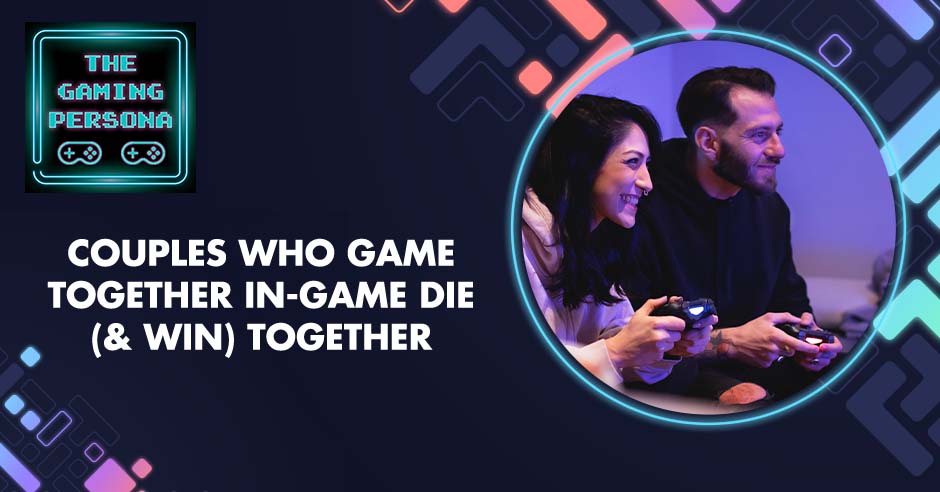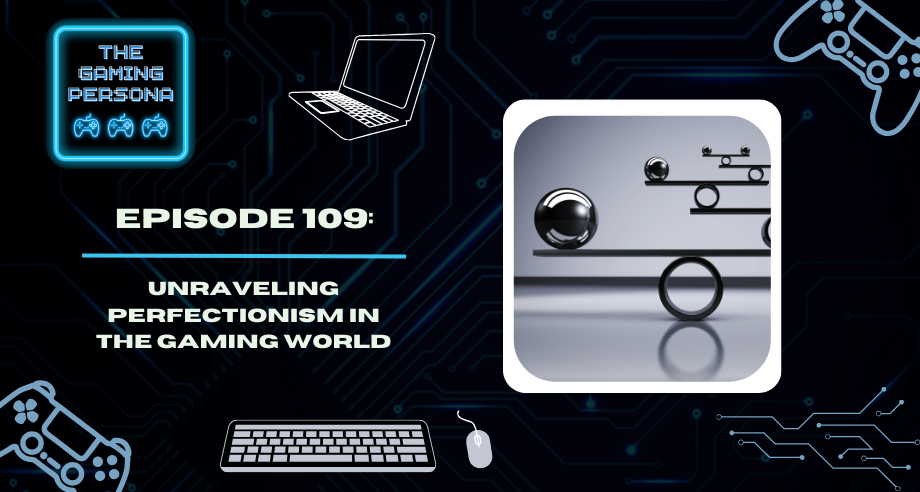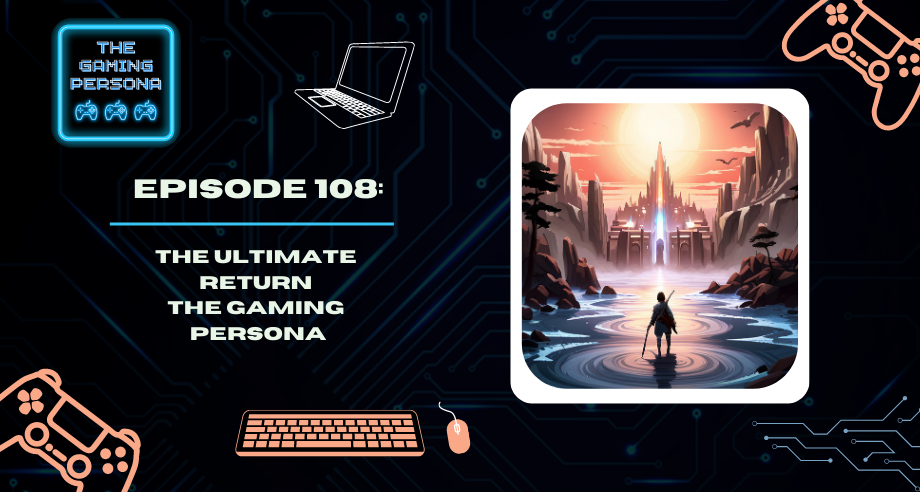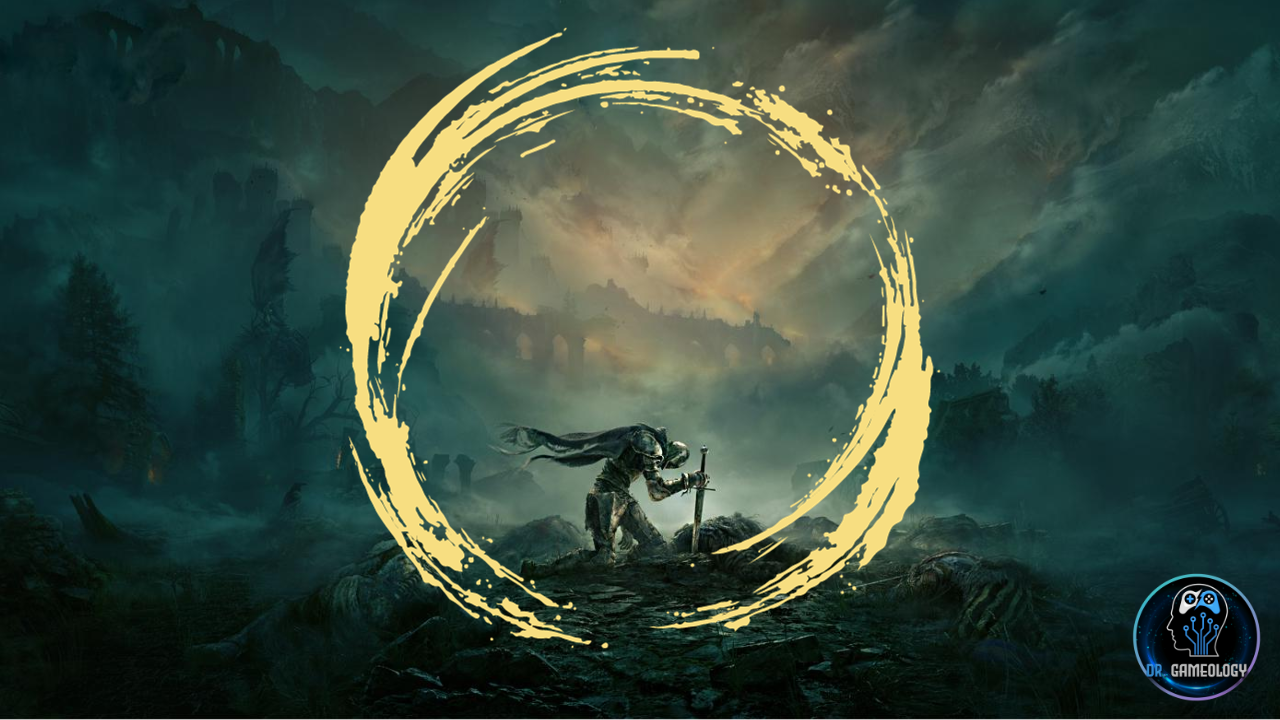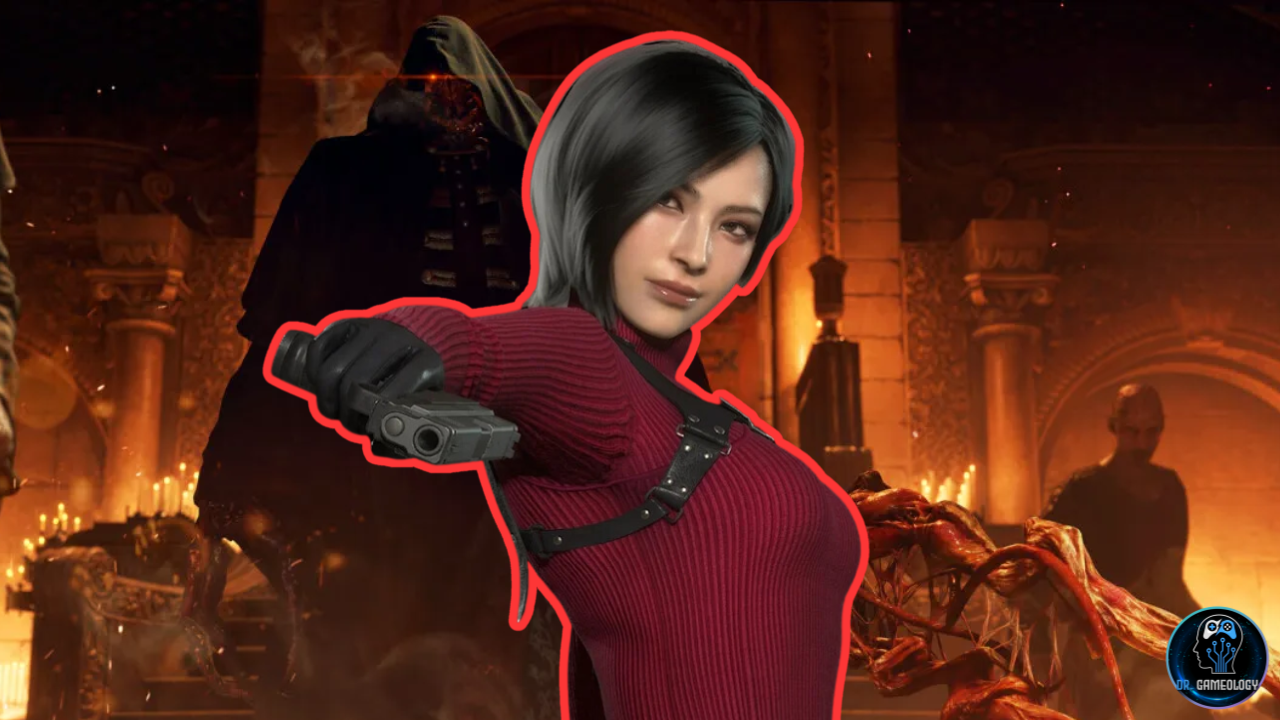Cooperative gaming experiences for couples are extremely rare. One game that focuses on this experience is the local coop game, It Takes Two.
It Takes Two was the winner of the Video Game Awards 2021 Game of the Year. The game features a married couple who are sucked into an imaginative and dangerous version of their own home life to battle the fears of their daughter who has just learned about her parents are getting a divorce.
Every challenge in this game requires both players to work together, while also providing a narrative discussion on healthy marriages and repairing damaged relationships.
Join Dr. Gameology and Jenny as they talk to, none other than the wife of Dr. Gameology, Julia Kaufmann. She comes on the show to discuss what it is like playing this game with her own husband. She also gives us an in-person opportunity to review the Bard Player type and other scientific studies on how games interface with marriages between players and non-players.
—
Listen to the podcast here
Couples Who Game Together In-Game Die (& Win) Together
Playing Cooperative Games As A Couple
I’m @DrGameology on Twitch and other social apps. You can find me on this show. This can be found on Apple Podcasts, Spotify, Google, Dr.Gameology.com and most anywhere else podcasts can be found. Jenny, what are we talking about from the world of video games?
We are going to talk about couples playing games together like It Takes Two.
That is going to be so fun. We have an amazing guest in my incredibly biased and subjective perspective on things. Before we get to that part of the show, we have a couple of parts of the journey we go through. Let’s do the ordinary world where we share everyday life through our game. What has your week been like in the world of gaming?
I finally played Final Fantasy. You weren’t there for it, but I did.
My Monday nights are a train wreck of task after task if that’s the day that you were able to play.
I made a plan to tackle some things in my life that have been falling behind. One of those things is taking time for myself to enjoy the people that I care about. Final Fantasy made the list. I have two days a week that I’m going to be playing. There are two days that you can’t play, which is tragic. I hadn’t played since March 25th. That was the last time I played in. Now is May 10th, 2022 or that’s when we’re doing this. When I logged in, I got this notification and it explained that I get the returners bounty, which is for players that haven’t logged in for over 45 days.
It was sad but also exciting because I get an XP Boost for our entire party. If there’s a mentor at the party. As you guys know, one of our friends, Jess, is a mentor. We grouped up and everybody else was getting my little XP Boost. It was nice. We did an Alliance Raid. We did Leveling Roulette. We did a Trial and we did some things to level up my Reaper because I think she is at a level of 77. I’m trying to get her up to 80 or 90.
You can do and walk her as a Reaper if you get into the 80s.
It Takes Two really gives a loving nudge to all kinds of different things that you can do with other people. Click To TweetI’m not sure if I’m going to do that.
You are going to do that.
I don’t know. I miss my Healer. I’ve only played three times in past however many months. Every time I play, I have to relearn what the heck to do as a Reaper. It was challenging at first. In the entire Alliance Raid, I didn’t do anything. I was just reading my moves and following along.
That’s amazing that you can clear Alliance Raids that way though. Do you remember any of the Boss Fights in particular? Was there anything memorable about which raid it was?
It was the one where there are three different groups. Half of your group has to be on the platform and the other half moves forward and fights the big bad. Everyone always competes to see who gets theirs down first.
You have four people on the pedestal that brings the light shield down. Those are the Realm Reborn Alliance. Those are a lot of fun. They are quick and low stress. They get you eased into the Final Fantasy style of Alliance rating.
It was nice. It was a lot of fun. I played for a couple of hours. I’ll probably be back on Thursday.
Thursday is not a very good game night for me because I’m teaching an internship class. It’s three different classes. The total length of time that I’ll be working with those students, every single Thursday is ten months. Every Thursday, I spend the whole day thinking, “I’m going to stream,” and then my brain is dead and then I don’t stream. That is the reality, unfortunately. Whoever gave you that advice has been paying attention closely to the Discord messages. I did post that it’s not fair to me to feel this let-down every Thursday when I run out of energy and I can’t do it.
If there’s any Thursday where you have energy but you don’t feel like streaming, you can always play with me.
It is a lot easier to just share your “I’m empty” energy and not broadcast live over the internet. I’ve been playing Final Fantasy XIV. I did Raid Night and we defeated the second Savage Boss out of four. That was my first clear on Hippokampos. It is the name of the boss with multiple heads that can detach from its body and attack you independently. That boss is like a nightmarish dog version of It Takes Two. It has been wrecking me for a couple of months. It was nice to get that clear. I feel good about it. We got to experiment for about one hour on the third boss, which I’ve never even watched a guide, video or read up anything. My strategy was to stay close to Jessica and hope that I don’t die, but it turns out that sometimes standing next to Jessica is exactly where you do die.
We ran into it yet again the idea of center is their idea of north. When they say, “Go to the middle,” I go to the center of the platform and they meant to go north, or maybe it’s vice versa. I don’t know what it is about the way my brain considers directional commands a square or circular battle arena. This happens to every new boss where the way people think about directions is not the way I think about directions. I get flattened by a Mechanic by standing right where you’re not supposed to stand. It’s like clockwork. It’s not I didn’t make it. It’s not scrambling. I authoritatively stand in the death zone proudly. I made it exactly where I want to be dead.
I have also been playing Elden Ring a lot. I was able to get a couple of upgrades to my outfit and got enough level-ups in the game where my build, which is a mixture of magic with enough strength and endurance to wield a great sword and a staff in my right hand, but my left hand usually has my wizard staff. I’m playing a sorcerer-focused build, so my main attacks are magic, but my spear is empowered with an ice spell. If I do a heavy attack with my spear, ice will go shooting in a straight line out. I have that extension to my abilities and I have a gigantic and glorious wizard hat.
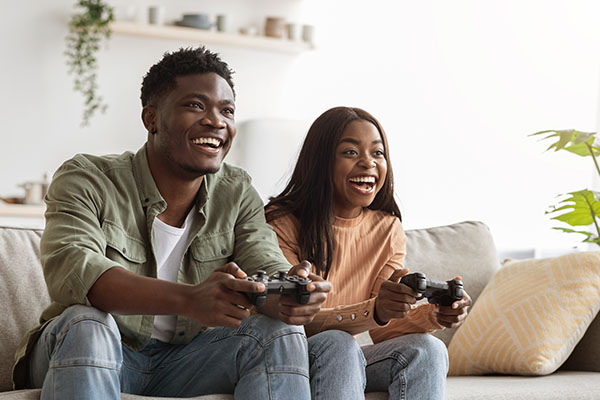
Kiriaye in Elden Ring is finally feeling like, “This is my character in Elden Ring.” Kiriaye in Final Fantasy XIV is at an item rating of 5.95. She’s very powerful and I’m doing okay at blackmail age. We’re clearing content. The group is such a nice social atmosphere as well. I cannot speak highly enough of getting to play with everybody. It’s a nice Tuesday evening. I look forward to it. I had a lot of work stuff that got in the way for about a month. I missed three raid nights in a row. It was nice to get to play. That’s the part of life we call adulting for us serious psychological types. Let’s go to our call to adventure. This is where we get into our topic.
—
Coming up on this episode, we have a guest joining. Our guest is the perfect person to talk about what it’s like playing the game It Takes Two with me, the person that we know as Dr. Gameology, and that is my wife, Julia. It Takes Two is a game that I started hearing a lot of things about. My wife started asking me to play it. I was busy and I had my list of games. I had things I needed to clear. I had content for different professional goals that needed to organize, get done or get worked on so we put it off.
We finally joined the EA Play subscription programs. Now we have all kinds of games from EA that we have access to. I can play on the PS5 or my PC. That’s one of them. I send you the trailer, Jenny, and said that I like to do the episode this way. You haven’t played it yet, so here we go. Since I’m the one playing it and I’m not an outside observer on it, what are you getting from the essence of the trailer and the research you’ve done on what this game is?
When I watched the trailer, first of all, it looked like I would love this game. It seems like each level or stage is a puzzle and you have to help each other get through it. It’s something you play with someone else. That’s another point in my book, but then there’s also the narrator of the book of love who shows that there’s a story behind what’s happening, which is nice. There are other games where you do co-op puzzle-solving that don’t have this narrative aspect to it. It looks amazing, whimsical and beautiful. The game itself is gorgeous. It seems like there are all different kinds of like worlds, settings and environments that you get to experience. It seemed amazing.
The game mishmashes a lot of things that you would find in two-player games, even if it’s something that you only do for about two minutes. In one of the opening levels, you’re exposed to these mini-games that are laid throughout the environment of the world. You know there’s a mini-game close by if the tambourine starts floating around in the middle of the air and starts shaking. That’s a signal of going into Explorer mode and finding the mini-game.
The first one I remember doing with my wife was whack-a-mole where my character goes inside a box with four holes in it. Hers goes to the top of the box where the hammer is. I have to use my control pad to tell the game which hole am I going to bounce out of. If I can pop my head up for one second without getting whacked, I get a point. If my wife whacks me in the head with the hammer, she gets a point. It’s timed so we have to play actively. We can’t do a strategy that psychs people out by not making an attempt to pop out.
The whack-a-mole idea is I have to constantly get up there into one of the four holes to try and earn a point, and then it’s over. You go back to the level, running, jumping, dodging fireballs, navigating cliffs, climbing and swinging on ropes. It’s a regular co-op platformer game, but there are these little moments where the game completely changes into something else. What’s cool from a design perspective is it gives a loving nudge to all kinds of different things that we can play with other people.
I’m excited because I learned that you could play it on PC. I would love to play this game.
After we talk about this with Julia, I have a couple of research articles that will bring the psychology of games idea home in a thought-provoking way. Let’s go ahead and move into finding your allies because it’s too dangerous to go alone. For the first time on the show, I am excited to bring the most important part of the life of the person that’s named Daniel Kaufman, not Dr. Kaufman, not Dr. Gameology, but the person that is Daniel. We get a big part of that while we find out all the flaws in my way of living life and loving video games. There is one person that I have always loved more than video games she’s on the show. Julia, my wife, the love of my universe, welcome to the gaming persona.
You’re making me tear up a little.
This is what happens when you min-max your love words the way that you work on your gear stats and ammo. Thank you so much for taking a little bit of your time to be on our show. Jenny, as we covered in the intro, my wife and I have been playing a video game on the PS5 called It Takes Two. It was obvious to me being a counselor who has watched many couples fall apart in front of my very eyes and trying to create conversations that are helpful for them that we need to cover this game on the show. What better person to make sure I talk about this game in the right way than the person that I try or do not try my hardest to use the ideas that come across in this game. Julia, can you tell us a little bit about what it has been like playing It Takes Two, the game, but also what it has been like playing It Takes Two with me.
I honestly think that this game was designed to play as couples. It would be weird if I played this with a sibling or my child. It’s focused on making your relationship better. In the story, they are a married couple who are on the verge of divorce. They have to go through all of these trials and everything to try to make the relationship stronger. Being in the relationship that we have, obviously, we’re not getting divorced, but we’re still taking those lessons on how to make your relationship stronger. It applies in real life. It’s a game but it’s also like marriage counseling a little bit. It has been fun. I get very frustrated very easily in video games. I have that anxiety of whatever I do affects what you do, Daniel. I have to make sure that I don’t screw up. I’m constantly saying, “I’m sorry,” over and over. He’s like, “Stop apologizing.”
It Takes Two is a video game, but at the same time is also like marriage counseling. Click To TweetThat was the first thing I thought of when I saw the trailer. I was like, “This means that if I mess up, we both mess up. This would be nerve-wracking for me.”
Sometimes it’s my fault because I didn’t shoot the thing the right way. Sometimes it’s Daniel’s fault because he crashed our flying ship into a wall while flying an underwear plane. I like the whimsical world that you’re in. It has very much like Pixar’s Tim Burton.
That’s a great descriptor. That’s what I got from the trailer.
It reminds me of the LittleBigPlanet games because there are parts in that game where you need teamwork in order to complete a task. The whole entire game is teamwork. You cannot play this game by yourself.
That is the biggest game design thing that jumps out to me. I’m enjoying it. I’m playing it with my wife and we’re having to form a team in order to succeed. There’s the Dr. Gameology part of me where the gears are turning and it’s like, “We’re going to talk about this on the show. We’re going to do blog articles about it. We’re going to possibly form a couples therapy research study using this game.” I’m using the language from Monomythical Hero’s Journey, the mentor in this game is a Spanish book of love.
It is cool because my mentor from Asbury was a Hispanic male and talked like this book. I’m having all these messages that I learned in a classroom about how you do family systems therapy and emotionally focused couples counseling. I’m seeing Dr. Javier Sierra in this book. I’m getting brought back to those days when I was a learner. From a game design perspective, there is almost nothing in this game that you can do alone. It takes two unless you have a good player and then they can solo the game and drag someone to success with them. The weapon in the very first level was the nail gun and the hammer.
I was the hammer you were the nail gun. He had to shoot the nails at walls and then I had to use my hammer to go swing on them, then go flip buttons and stuff in order to release doors so he can get to the side I’m on. It’s solving puzzles in that way.
I love puzzles.
You would love it, Jenny. It’s very fun.
Where does it play on?
We’re playing it on the PS5. I know that you can play it on other systems.
Is it on PC?

You can play it on Windows platforms. The cool thing about it is you have to coordinate your timing a lot. There was a situation where we were on a space-based level. You go inside your daughter’s mind. We need to keep simple the setup for this game. I already mentioned my research study idea. If someone is reading the show and wants to do it and beats me to it, I have a lot of things going on. By all means, do the It Takes Two research study.
You have a couple who wants to get divorced, a husband and wife with a daughter. The daughter does not want her parents to get divorced. This is a very common setup for storytelling. She has some tears come out of her eyes in the shed in the backyard. They fall on these clay and wooden voodoo dolls that she made of a woman and man who don’t look like her parents, but they represent them in the tears suck their souls when they take their power naps that afternoon into the dolls. They wake up in the dolls.
The setup for the levels is you’re trying to get to your daughter because you have this theory that her tears will send you back to your actual bodies because nobody wants to be tiny, miniature clay and wood voodoo dolls. There’s a level where somehow we transcend the physical reality and we go into the daughter’s mind, which is outer space.
Your powers and weapon abilities change at every level. You do not carry the same. Hammer and nail are only in the first level, then you have a new set of powers. On the second level, I was nectar and Julia got to be explosive matches shooting out of a gun. She would explode the nectar, but the enemies would not explode if I had nectar them first. You can’t even defeat a single enemy by yourself in this game. Dear, would you like to tell what happened when we were using our space powers because I’ve been rambling?
Are you talking about where we got the trophy?
Yes. Tell the trophy story.
First of all, let me preface this by saying that his power in this particular level was a belt that would shrink him tiny or make him very big. My power where these space boots that made me be able to walk upside down, anti-gravity and all that good stuff. I had to get up to this level. He turned big and jumped on a little thingy that made me shoot up in the air, and I got up on the thing. I sat up there forever trying to figure out, “How do I get Daniel up here with me?”
Finally, he goes, “You need to ground pound down to me, then I will go shooting back up.” I’m like, “Okay.” I ground pound down without even hesitation. I did it immediately but he was still in his tiny form. When I did it, he goes shooting out into orbit. I killed him and we got a trophy for it. It wasn’t a bad thing. He told me what to do and I did it with no hesitation. He’s like, “I wasn’t ready yet.”
There are many situations where the “I’m not ready yet” thing happens. There was a wall-jumping puzzle where I was controlling, which wall would pop out of the sidewall. If I have the left and the middle, Julia can wall jump and get up to the top on the left side. Eventually, she asked to switch to the right side. I need to have the middle and the right platform. I did not put the right platform up for her and she fell to her doom.
It’s all about timing, communication and coordination. There are so many times when you lose a life, but you rematerialize on the last safe platform that you were standing on in most situations in this game. There are times when I’ll have an idea of how we can do it better. Sometimes it’s received easily. Other times it’s more of, “Stop telling me what to do. I obviously know the solution to this.”
I want you to be right there.
I’m not perfect and sometimes I’m the person who’s like, “This is stupid.” It’s a good activity to help you realize you’re not perfect and to practice being imperfect with your game partner. In this case, my game partner is my permanent teammate for life. The big thing in couples counseling sometimes is the counselor doing these sessions and try to guide people to these ideas of happiness and collaboration.
It Takes Two's visuals are Tim Burton meets Pixar. Click To TweetI don’t see people as teammates because they don’t do very many things like It Takes Two together where they’re in it together and they rely on each other. A lot of times, it’s just two solo players in life that decided to be around each other a lot, but they’re still doing everything solo. Maybe they just live in the same space.
As you guys are describing this game, I’m thinking of areal-world scenarios or descriptors in relationships that this game would build. You mentioned communication. That is probably huge in this game and in a relationship too. The collaboration, you need to work together with your partner to make things work smoothly in your relationship. The compassion when you don’t do something right, and just fun and happiness.
It creates a moment where we get to be in the living room. It’s a co-op game. There are a lot of games where you can play co-op. What I mean by that with surprise is it still splits the screen so multiple people can play. Mario Kart is a good example of this. A lot of video games that say they have a co-op mode do not do that anymore. They just have multiplayer where you can form a party using the console. Both of you need a console, a copy of the game and a TV somewhere that you’re playing full screen. You both need a headset or use the Discord app on your phone. You’re playing together alone.
Local co-op is the term. It’s being able to be in the same room.
It’s nice that you gave the vocabulary. I was going to say local co-op is a lost art form in video games. What you’re showing that I’m happy to point out because this is one of the things I enjoy the most about our relationship is that we have things where one of us likes it more than the other, but we still do a lot of those things together because it’s not like the other person hates it. Obviously, there are things that will happen that Julia will enjoy more than I do, but I still like walking around there. There are things that will happen on my PS5 that I clearly enjoy more than Julia, but she will enjoy playing them with me.
This game draws out some of that common ground. It makes you experiment with the common ground and see what it’s all about. It’s another set of 1 to 2 hours where we get to sit in the living room, interact and problem-solve together. I want to include some of the things that we usually include when we have a guest on our show. Julia, you gave us your personality letters and motivation scores. I want to talk about how some of these ideas have appeared in a previous episode. One of our first player-type episodes was about the Gardener. Honestly, I was thinking a lot about you when we are doing that, but we didn’t have definitive scientific proof.
My wife got the Gardener motivation type and we’ve included a description of that. You’re looking for a quiet, relaxing, task completion, collection focus kind of game activity. You like planning out ways to get that trophy star collection building and continue moving forward. One of the big games for this is animal crossing, which is one of those blind spots for me. I can’t even talk about animal crossing because I’ve never played it. Can you talk a little bit while we’re on it? Could you explain what it is about animal crossing and the Gardener player type that explains the things you enjoy the most about video games?
In my routine, I have to log in and check my village. I go into animal crossing at least once a day and I have to water the flowers, hit the rocks, and get the things to sell to get bells because I’m trying to expand my storage and my house. For me, it’s relaxing because it is task completion. I want to collect every single thing in the game. When I got the game, the first thing is I have to build my aquarium. I have a very deep love for aquariums. I wanted to get every single marine animal. I had it completed within the year because the way that this game is it’s seasonal. Every month there are different things available. You can, “It’s June so I can catch dragonflies.”
I’ve had the game for a couple of years now and I have everything completed, my aquarium, my bugs, everything is done. The only thing that I have never completed is my artwork. I’m still trying to get all of the art and the art guy only comes once every couple of weeks. That has taken some time. I enjoy animal crossing for that. I also like my little villagers. They’re little animals. They’re super cute. Sometimes they’ll just tell you, “I want to leave.” I never stopped them. I’m like, “Move on. Go to different distant lands.” I’ll get a new friend to come in and I’ll be friends with this bunny instead of this cow.
For me, it’s relaxing. I like to water my flowers, shoot balloons, and get presents for my villagers. It’s always been that way for me for games. That’s why I like Pokemon so much. It is because I want to collect. I have to catch them all. This is going back to when we used to play SWTOR together, one of my favorite things was the Datacron, collecting those. I like collections. I don’t know if that’s just a game thing. It’s a thing in real life too. As my husband will tell you, I collect many things. That’s why I’m the gardener. It’s funny because when you say Gardener player type, most people automatically think animal crossing because you garden in that game. Gardening is the one thing I do least. It’s funny.
Completion is one of those components when you go deeper into the Gamer Motivation Profile. If you take a look at your scores, the highest ones are in discovery, design and completion. The collecting thing makes a lot of sense.
I also have a thing with checklists. If I’m playing a game and I have like a quest list, I want to check off all of the quest lists. I heard that the game Daniel is playing, Elden Ring, he said there’s no quest list. You have to remember, that’s my nightmare. If I don’t have a list to check off, I don’t want to play it.

There is a list. You need to buy a journal and write it down yourself. When you mentioned Datacron, I want to include this in the show. This happened to me one morning. I was playing Elden Ring. I’m trying to finish it because there’s a spot in the book I’m writing where I want to be able to comment on multiple endings. Specifically, I wanted to bring in Elden Ring. I’m on this castle and I’m jumping across the different ledges and things. I jump over to this staircase. I was like, “Good. It’s a staircase.” This is much easier to walk on than the ledges I’ve been jumping on for five minutes,” then a giant metal ball rolls down the stairs and kills me. That is what it’s like playing Elden Ring. There have been times when the three of us have been on raid teams and have played Star Wars: The Old Republic. Jenny, you were a part of that original raid team.
I did not have the affinity for Datacron hunting as you did.
I’m also thinking about all the activities we’ve done in SWTOR and Final Fantasy to collect mounts. If it’s an achievement thing where you have to defeat a boss, but there’s a mount there, sometimes we can work on playing harder together, which is my motivation type to win tough things, but not necessarily either of your motivation types. Collections can bridge the gap to create common ground.
I’m thinking about that too. When I think about me trying to get all of the horses in Final Fantasy, it wasn’t about collecting all of them for me. It was about playing with my friends.
You got all the horses though.
I did on the first try every time.
I have them all too. It was a big thing. I was like, “We’re going to go horse collecting.” I was very excited about that, but when it was like, “We’re going to do this raid to complete the boss,” I’m like, “Why? I’m not going to get a pretty at the end.”
It’s extrinsic motivation. We need to go get the birds. We’re all level 90 now. I’m sure we could get the birds.
I have a few of them.
I have all the birds.
You’re ahead of us then.
She’s the gardener.
Local co-op is a lost art form in video games. Click To TweetWhat do you think about the Psych Squad’s decision to refer to you in Discord as Mrs. Gameology? I had already asked you to be on the show and then a message pops up asking you, “What does Mrs. Gameology think about such and such game?” You were looking at my phone because I need you to search for something while I was driving, and you are like, “What is this?”
It popped up and I’m like, “They call me Mrs. Gameology? I was not aware of this.” I don’t have a problem with it. I think it’s endearing. It surprised me. I was like, “I didn’t know that they talked about me.” It was a joke because it was a Psychology thing that someone had said that the reason that you nabbed me was you used Pavlov’s experiment but with candy. I was like, “It does not what happened.” I don’t think he had ever given me candy unless it was an occasion like Valentine’s day or something. He doesn’t walk around and be like, “Have a piece of candy. Candy equals kisses.”
Julia, thank you so much for taking the time to be on the show with us. We’re going to move into the ascent to elevate the topic, but you have already given us the biggest and most valuable information for our episode. I can’t wait to have you on again when we do more co-op or collections.
—
Now we’re at the ascent where we elevate the topic. I had a lot of fun with that segment. That’s a big risk. In my head, it’s like I’m bringing an important part of my personal life into the show. I know when you’re listening to podcasts, a lot of times to the better ones, you do feel like you’re getting to know the person because you’re getting their ideas, but there’s always that little bit where, “This is who I am when I’m recording a podcast.” That is what it’s like to walk into the living room and be able to talk to.
I’m really glad she came on.
For the ascent, we have two very different research studies that came out in the last years. It talked about how video games factor into the relationship of a couple. It’s interesting because this is how video games factor into counseling with couples and talking about the psychology of what can video games be both not good and also very incredibly good. The first study is called Gaming In The Game Of Love: Effects Of Video Games On Conflict In Couples.
The game It Takes Two is about a couple that’s experiencing frequent conflicts. The first boss in that game is a vacuum cleaner that broke. Instead of making the attempt to fix it, one of the members of the couple threw it in the shed in the backyard where it continued to be broken, and they bought a much better vacuum to use in the house, which is great until you animate the broken vacuum. It’s sitting there in the shed with feelings of loathing and low self-worth because you abandoned it. It has no purpose anymore and it doesn’t even work right, then you become small shrunken characters and have to win a battle against this very angry vacuum.
The couples have this back and forth dialogue about, “I thought you said you fixed it.” “You bought the new one.” It’s all the finger-pointing. The game has so much finger-pointing in the dialogue between the couple who’s stuck in this bad situation. Their peril relies on them overcoming the times that they didn’t tell the whole truth or let their partner down in some way. Before I talk about this amazing chart with arrows connecting all the squares and going in all directions, what do you think will happen when we break down this study talking about how video games become a factor in couple’s relationships?
Are you asking me what I think the results of the study are going to be?
When I bring up this idea, what’s your initial thought about, “This is probably going to be?”
I like the way that It Takes Two approaches this situation. Something tells me that this is a unique game and that the results might show that there’s an increase in conflict.
This chart looks at couples in which one member of the couple is a video game player and the other is a video game non-player or possibly even a video game rejecter. One of the things that always puzzles me as a mental health professional is how do you end up in these important high intimacy relationships where a thing that you enjoy doing for fun is totally rejected by your partner? I know for me, I would never thrive in a relationship where my spouse hates video games.

I feel like there’s a lot there. I don’t want to make any assumptions, but I can see where two people who aren’t on the same page with video games can make it work. If you’re like fully rejecting it, that’s a different story
This first article is by Coyne et al. from 2012 and it is published in Family Relations. It looks at the connections statistically between video game use and aggressive behavior in your relationship, so physical aggression and relational aggression. The way that they are finding these connections is by looking at time problems in your use of video games and content problems in the relationship from your use of video games.
Basically, it’s if you are playing a game that is making you focus on different styles of aggression or conflict resolution, you become more angry as a person. It’s that kind of an idea, or you didn’t do something that would have been valuable for your relationship quality because you were busy playing video games. It breaks down what this looks like when the game player is male as one category of connections and what this looks like when the video game player is female.
There is a lot of valuable information here. There are lots of statistically significant connections, but not every connection is a significant one. A lot of the significant ones first coming out of just playing the video game comes from the male playing, but the female reporting the play problem. In those cases, there is a strong correlation between if the females report a problem for their male game player, the male is also admitting there’s a problem from their point of view as well. We’re trying to take something that is a little bit complex and boil it down to a simple conversation.
Complex is an understatement when it goes to this chart.
There are many arrows going in all directions, and there are asterisks on a lot of the connections, which means a statistically significant result. What we conclude from this study is if you’re not on the same page with your partner about what video games are as a source of fun and enjoyment or even a way to connect with your own abilities as a person for problem-solving like I tend to look at them, then everything you do while you’re logged in playing a video game is going to be driven by the motivation to avoid your relationship goals and adult responsibilities.
Therefore, if I’m having a disagreement with my wife who is on the show and I was playing a video game before that disagreement that probably has nothing to do with video games, the correlation in the mind of the relationship, her mind and my mind, and then collectively, our minds will conclude that that quarrel is because of video games.
A lot of times that is distracting. We can’t do anything with it because the problem is you had a disagreement and you disagree fundamentally about what is okay to do in your day. If there is no common ground there to collaborate, then you’re going to disagree. You’re going to be unhappy. That total unhappiness will eventually lead to louder voices and possibly aggressive behavior that can be recorded by a lot of people.
That brings us to the second study and this one is much more the It Takes Two and Dr. Gameology direction of discussion about what video games can be. This study was about Sociality in Single Player Games. It’s a case study of tandem play amongst friends and couples. This is not an It Takes Two situation that is co-op playing, but this is a single-player game where we can pass the controller and share the experience together. I’ve listened to many podcasts and seen many videos where a person will watch the complete play of their partner and be there as a permanent commentary partner or collaborator. When you do that, Jenny, what is it that you’re aiming to get out of the experience?
I’ve been on both sides of that. I have been the player of a game where my partner was there as a guide and an encourager and just there to have fun with. I have also been the person who likes to watch my partner play a game. In the first scenario, it’s nice to have somebody there who might have a different perspective, might be able to help me if I get stuck on something, or be there for extra fun. Everyone knows that I play video games with other people, even games that aren’t meant to be played with other people.
I resonate very much with the content of the study. On the other scenario, I enjoy watching people play video games. I got into Twitch one summer, and it’s similar to that. When it’s someone you are with and who is important to you, it’s fun to see them succeed at things that are difficult. It’s fun to help, make jokes, and contribute to the positive gameplay.
I usually am the game player in these situations. This is not something that I think would fill me up with excitement. That’s because I want to be the person who plays the game and does the problem solving and has the controller. It’s my incessant need for control. This study was published in 2018 and presented at the 51st Hawaii International Conference on Systems Sciences and it’s by Consalvo et al. It was able to identify a lot of bottom-line insights into what happens when you do choose to play games together as a couple or with close friends. We have a list of bullet points here that are my summary of what this article concluded. I would like to pass these back and forth and share them, maybe say one thing or two about each one so that our audience can get the full experience of our ascent through the topic.
Couples can experience benefits with co-op approaches for solo games. Click To TweetThe first bullet point, “Player pairs often have unique processes for decision-making.” I mentioned this when I mentioned about when I play with my partner. It’s nice to have an extra perspective on things. He might go about a puzzle in a totally different way than I would, and that’s helpful.
We don’t have to do things exactly the same way. The next point is, “Closeness shifts fluidly during play between cooperation and critique.” We talked about this in the part of the episode that was an interview with my wife. A lot of times, the harsh feelings in relationship struggle come from there’s no apparatus for sharing any kind of feedback with your partner. It either is a congratulation or silence. If it’s anything short of a good job, then we’re going to throw our gloves down and put up our fists in the form of words, hopefully. If you’re playing a video game together, eventually you’re going to have to cross that bridge and realize, “They do like, believe and trust me. They’re just offering an idea that maybe I didn’t see it.”
“Couples can experience benefits with co-op approaches for solo games. Narrative can have positive impacts on a couple that focuses on gaming experiences.” In general, this is saying like for example, I played Final Fantasy X for the first time, and it’s nice to be able to have somebody there who has already played the game, has already gone through the whole story, is already excited about the story, and is able to be there to give me tips on what to do. Overall for me, it’s pretty positive. Even if it gets into the critique area. I like being critiqued when it comes to video games. I love knowing what I can do better.
Also in the relationship, if your partner wants to make a reference to Tidus, Auron, Yuna, Wakka, Blitzball, Sin or Spira, you could theoretically know what that conversation is about and be excited to talk with him back with ideas that are yours. A lot of times, this disconnect in relationships, especially with the “I like video games and my partner doesn’t” problem is you don’t have that common ground to bounce ideas off of each other. If I want to make a reference to rapture from Bioshock, my wife will be all over that. She’ll be able to send that back to me and then my idea can build beyond what it was five seconds ago.
That’s powerful and that’s not even a co-op game. It’s just a virtual story that we both have built some affinity or connection to. Games can be a primary motivation for coming together moments. They’re an opportunity to do something together and it’s an active activity too. I cannot express this enough. I will die on this hill, Jenny. I will always believe playing a video game with someone is better than watching a show on your favorite streaming app with someone because you are both doing it. There’s something about that active nature of a video game that makes us part of the story and that makes it matter.
“Social enjoyment of a game can occur even if the game is not liked by both players.” You talked about this when Julia was on, how you both like to do things together. Even if you’re not that into whatever her style of play is or a particular topic in a game, it’s nice to spend time accomplishing something together. It’s not about whether or not you like the game. It’s about how much you like your partner.
This study talks about a game where both people reported they did not enjoy the game. The game was the Game Of Thrones that was created by Telltale Games. This is a story-focused decision-making game where you interact with the characters and make decisions about alliances and things. This is the same studio that made the much-acclaimed Walking Dead video games. The Game of Thrones one was not their best effort, but they also did Batman and several others. Wolf Among Us is another title that they did. They’re known for their character-driven story and choice-based games. In this instance, the data suggested that you enjoy the game because you’re playing it with someone, not because of what the game itself is in a vacuum.
I’m going to do the last two points together, “Social viewing is inherent in gaming. Knowing when to comment and when to view the gaming events is part of that social experience. Tandem play as a feeling of natural interaction outside of the game place.” We covered that if you are playing a game together, you have that shared experience. You can talk about it while you’re going through day-to-day life with this person who you probably like at least a little bit.
These are all the takeaways from this conference presentation. If we take both articles together, we get a clear picture of how video games are perceived in our society at this point in time. They’re either a reason to explain everything you’re doing wrong in your life and why you’re not successful and it’s hard to be around you, or they’re amazing places to congregate and share experiences. Because we did these together, the value in our relationship has built to something that I wasn’t fully aware of before.
I wonder which one we resonate more with.
I’m definitely in Consalvo et al. 2018 with the player pair’s unique decision-making processes and tandem play.
This would be a whole different show if you weren’t.

This would be the Gaming Despair Podcast where we talked about, “This is the show that explores all the things that are wrong in our lives and we blame video games. I’m your host, Dr. Sadology.”
What a terrible alternate universe.
What if we do an entire episode that captures the emotion of being in the land of Elden Ring? When I finish Elden Ring, we’re going to do an episode where we completely talk about triumph over despair. There are many foreshadowed concepts. I hope someday we look back and we’ll find all the ideas that we never did.
We need to bookmark this, timestamp it, and come back to it.
Let’s go and return where we go back to our daily lives and take the next step forward. Many things happened in this episode. I know it’s a full discussion of co-op gaming and the value of couples playing games together. What do you think you’re going to take with you from the experience of our talk here?
I am not at the point where I could see playing a game like It Takes Two would ring all these alarms and have me say, “This needs to be a topic for our show. This would be a great tool to use in therapy,” but once we talk about it, it’s like, “This would be amazing.” They talk about divorce in the show. The whole point of the game is for you to collaborate, communicate, and get to the point where you are in a better place in your relationship. It is something that I’ve done all the time. I play solo games and any kind of game with my partner all the time. It’s a huge part of my life. It’s something that brings us together. It’s something that I’m grateful that I chose someone who is into games, video gaming, and likes to do the things that I like to do.
That common ground is so important in terms of compatibility with a partner.
For those whose partners are more into gaming than they are, I challenge you to look at it differently. Look at it in a way that it might be something that brings you together rather than drives you apart.
If your partner is playing an MMO, create a character. Being able to understand the viewpoint, even if you think the game is trash. The shared viewpoint of, “I can see why they are playing different quests.” It is cool when you look back on your character and their outfit is more interesting to you than it was a day ago. Understanding how the person that you love is experiencing fun in a fulfilling way in this activity. If you reject that entire activity, that’s such a strange choice for the desire to have a warm thing connection in a relationship. That would be like your kids saying, “I want to learn to play the guitar,” and not only do you stop them from getting access to a guitar but you cancel their Spotify too like, “You can’t listen to music.”
That’s a great comparison because that’s what video games are to a lot of people.
That’s what we’ve been talking about for years. I have one last quest for everyone to collect and move forward. Find the things you love and do them with the people you love. It takes two or more, and continue the journey.
See you in the next episode.
Important Links
- @DrGameology – Twitch
- Apple Podcasts – The Gaming Persona
- Spotify – The Gaming Persona
- Google – The Gaming Persona
- Jenny Lebron
- @J.LebronPhotography – Instagram
- JLebronPhotography.com
- It Takes Two
- Gaming In The Game Of Love: Effects Of Video Games On Conflict In Couples
- Finding Sociality in Single Player Games

